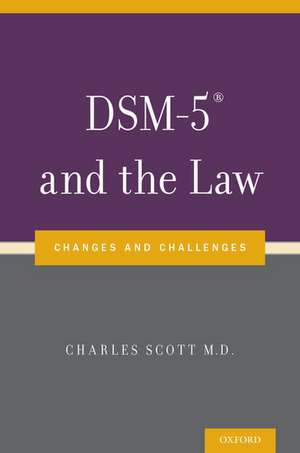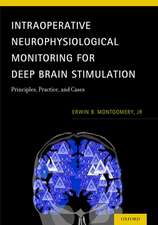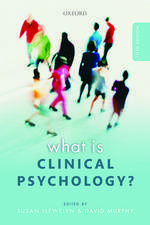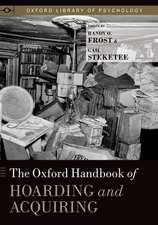DSM-5® and the Law: Changes and Challenges
Editat de Charles Scotten Limba Engleză Paperback – 9 iul 2015
Preț: 440.88 lei
Preț vechi: 547.84 lei
-20% Nou
Puncte Express: 661
Preț estimativ în valută:
84.36€ • 88.32$ • 69.80£
84.36€ • 88.32$ • 69.80£
Carte tipărită la comandă
Livrare economică 26 martie-01 aprilie
Preluare comenzi: 021 569.72.76
Specificații
ISBN-13: 9780199368464
ISBN-10: 0199368465
Pagini: 304
Dimensiuni: 155 x 231 x 23 mm
Greutate: 0.5 kg
Editura: Oxford University Press
Colecția OUP USA
Locul publicării:New York, United States
ISBN-10: 0199368465
Pagini: 304
Dimensiuni: 155 x 231 x 23 mm
Greutate: 0.5 kg
Editura: Oxford University Press
Colecția OUP USA
Locul publicării:New York, United States
Recenzii
This book clearly explains sophisticated nuances of DSM-5 diagnoses that will protect you from making errors on the witness stand. A must-have for all forensic clinicians.
Dr. Scott has provided a comprehensive, scholarly, and insightful review of the process of development of the DSM-5, the American Psychiatric Association's most up-to-date psychiatric diagnostic classification system, and the implications of the changes embodied in the DSM-5 for the field of forensic psychiatry. The chapter authors, experts in their respective fields, have applied their breadth of knowledge and expertise to the analysis of the DSM-5's changes as they relate to criminal, civil, disability, and educational forensic evaluations, including? the assessment of malingering. Dr. Scott has masterfully organized this volume such that it provides both in-depth information and practical guidance that will be of invaluable assistance to forensic psychiatrists in addressing the controversies associated with the DSM-5 that may arise in the courtroom and in incorporating DSM-5's changes into their forensic practices.
This is the only work of its kind I have seen, and it provides a comfortable bridge between the functional changes associated with the DSM-5 and the effect they will have on completing forensic evaluations, both for civil and criminal matters. Chapters are well thought out and reasonably brief. The clinical vignettes help highlight the types of changes which could cause some practitioners difficulty. This is an impressive book that should prove to be a valuable resource for forensic practitioners or trainees.
Dr. Scott has provided a comprehensive, scholarly, and insightful review of the process of development of the DSM-5, the American Psychiatric Association's most up-to-date psychiatric diagnostic classification system, and the implications of the changes embodied in the DSM-5 for the field of forensic psychiatry. The chapter authors, experts in their respective fields, have applied their breadth of knowledge and expertise to the analysis of the DSM-5's changes as they relate to criminal, civil, disability, and educational forensic evaluations, including? the assessment of malingering. Dr. Scott has masterfully organized this volume such that it provides both in-depth information and practical guidance that will be of invaluable assistance to forensic psychiatrists in addressing the controversies associated with the DSM-5 that may arise in the courtroom and in incorporating DSM-5's changes into their forensic practices.
This is the only work of its kind I have seen, and it provides a comfortable bridge between the functional changes associated with the DSM-5 and the effect they will have on completing forensic evaluations, both for civil and criminal matters. Chapters are well thought out and reasonably brief. The clinical vignettes help highlight the types of changes which could cause some practitioners difficulty. This is an impressive book that should prove to be a valuable resource for forensic practitioners or trainees.
Notă biografică
Dr. Scott is a Professor of Clinical Psychiatry and Chief of the Psychiatry and the Law Division at the University of California, Davis. He is a Past-President of the American Academy of Psychiatry and the Law (AAPL) and has been a national instructor for the AAPL Annual Forensic Psychiatry Review Course for over 15 years. He serves as a consultant to the California Department of State Hospitals statewide implementation of DSM-5.










